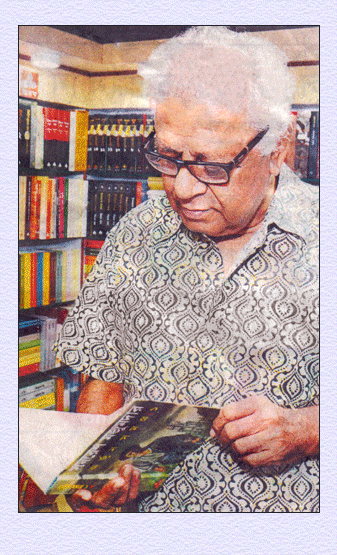


| Readers' comment |
Shraddheya,kakhono vabini eto sahaje apnake lekhar sujog pabo.amar pronam neben.apni sei birol gotrer lekhak jar je kono lekhai sukhapathya.jemon shradhdheya Narayan Gangopadhyay ba Banaphool er lekha porbar samay hoy.apni emon maper lekhok je apnar lekha pathe rosgrohon korte hoy Merudando diye.ami Moti Nondi mahashayer katha mone rekhei bolchi.amar bayas 29.ebong bangla sahityer chatra ami.bekar bortomane japani vasha sikhchi atyanto manojog die.asha kori kichudiner madhyei arthik sankot katiye uthbo.ami takhan ekbar dekha korte chai apnar songe.apnar lekhay Bipin Krishno Ghosh mashayer katha ache.amar kache onar ekti chotto pustika ache.nijer janmadin upolokhkhe lekha.nam sharahato linette er katha.boiti amake O2 jogay.jemon apnar kalbela,satkahon jogay.apnader sridti akhkhar mathay basa bedheche bolei anek kichu perechi ebong aro anek kichu parbo.amr khub iccha jiboner prothom maine jakhan pabo takhan apnake kichu di.shradhdhrgho.apni pitriprotim. janmoda ta pita jemon shradhdhar temni je manush tar lekhay mithyer sange apos na korte sekhan tini o ki pita non? Amar pronam neben.valo thakben. ------------------------------------------------------------------------------------------------------ Very few works of art earn the right to be called spokesperson for “a generation lost in space”, a time capsule that manages to make some people happy, some sad, and nearly everyone deeply nostalgic for a time that is gone forever. Don McLean’s timeless song “American Pie” or Bob Dylan’s anti-war anthem “Blowin’ in the Wind” instantly come to mind; so do Dennis Hopper’s hippie movie Easy Rider and Jack Kerouac’s Beat classic On the Road. I feel Samaresh Majumdar’s award winning novel Kaalbela, written in the early 1980s, could also be counted a part of that elite list. Its being a Bengali novel might have served as a hindrance where universal appeal (like those mentioned above) is concerned, but it was nearly as effective. Having read a few books in my two-and-a-half decades’ existence, I have managed to narrow down to two self-conflicting feelings that manage to let you (in this case, me) know that a book worth remembering has been read. The first is a sense of exhilaration while uncovering what the author has to say, and perhaps more importantly how he says what he has to say, while the second is a touch of sadness on completing the book because there aren’t any more pages to turn over. Though it would be preposterous on my front to compare Kaalbela with books recognised as masterpieces in Bengali literature, I must concede it did succeed in eliciting those singularly memorable feelings in me. And therein lays the true worth of the book. Kaalbela, though a standalone novel in itself, is essentially part of a trilogy written by Majumdar. It is preceded by Uttaradhikaar, and followed by Kaalpurush. However the one sandwiched between them is the most well-known and revered of the three, and hence my decision to break the order and go directly for Kaalbela. The fact that it didn’t just make me want to know what happens next, but also what ensued before the story begun, is ample proof of the book’s ability to engage as well as touch a chord. Late 1960s and nearly the entire 1970s were a markedly turbulent era what with events like the Vietnam War, and an alarming growth of disillusionment among the educated middle-class, especially students, in various cities of the world, followed invariably by a distinct intellectual leaning towards Leftism. Some chose to take a semi-peaceful stance as in the anti-Vietnam War protests in the US, culminating in massive rallies and events like Woodstock and San Francisco; some chose to limit their agitations to strikes combined with a defiant “let’s see how far the government is prepared to go” kind of attitude as in the general strikes in France, started by students of the famous Sorbonne University of Paris. But there were others who felt the need to inflict one massive surprise-blow to the head of capitalism and pseudo-socialism – be it in Berlin (Red Army Faction) or Rome (Red Brigade). They believed in the intoxicating doctrines and deeds of the likes of Lenin, Mao Zedong and Che Guevera, and sought to kick-start a revolution or “People’s War” through urban guerrilla warfare against the state machinery which they severely and passionately despised. One such far-Left armed-revolutionary movement started in Kolkata (then known as Calcutta), called the Naxal Movement – the name originated from a small village in north Bengal called Naxalbari. Though mostly a tribal movement now, it was then essentially a movement of and by the intelligentsia, including some of the most brilliant students of those times. Kaalbela, told through third-person narration, is about Animesh Mitra, a young, mild-mannered guy from a simple middle-class family from North Bengal, who has come down to Calcutta to pursue B.A. (Bachelor in Arts) in Bengali Literature. However, on the very first day of stepping onto the city he realises he’s landed right into a hotbed of politics, with trams burning as mass protest against the then-reigning Congress government. And, in a tragic accident, he becomes an unwitting part of the situation when he’s fired upon in his leg by the police who mistook him to be a part of the ‘rioters’. He’s hospitalised for a long duration, and upon release he joins Scottish Church College for an uneventful three-years of graduation. But somewhere deep within, though as yet he’s unaware of anything consciously, a seed of distrust for and a deep apathy towards the government has gotten sown in his mind. Only after starting his post-graduation in Calcutta University does he slowly and irrevocably drawn towards active politics, though, at first glance, not of his own volition. But whenever he speaks on any issue, however trivial, you know he’s not born as much for politics (though he’s politically conscious) as he’s for rebellion. And the more his involvement with the students’ wing of the Communist Party of India (Marxist) increases, the more he realises CPI(M) is just another political party. As frustration, disgust, and rage slowly start filling up his belly towards the intolerably corrupt, arm-twisting and selfish nature of the politicians, he is one fine day visited upon by a man from his past – a man he deeply respects and looks up to. Subhash Sen, a fearless, enigmatic, and mesmerizing character, who has devoted all his life towards communistic principles, and who’d saved him on that fateful day he’d landed in Calcutta, as well as introduced him to student politics, draws him to be part of a radical movement that literally shook the government out of its slumber. As part of the armed Naxalite uprising, he dreams of helping shape an egalitarian society devoid of corruption, injustice, poverty and the fact that people has just stopped caring about the country anymore. But, in the same way as a paper boat can sail only so far, such lofty and deeply idealistic dreams can also last only for so long. The police, when given carte blanche by a desperate government, can be a monstrous opposition to deal with. Thus, not only do his dreams get shattered into a thousand pieces, so does his body when he ends up getting subjected to brutal, inhuman torture in police custody. While the backbone of Kaalbela is ‘revolution’, that of Animesh is the unconditional and selfless love and support he receives from his college-mate Madhabilata – as fiercely independent and strong-willed a girl as there can be. It is her love that in way instills a desire in him to forsake a safe future in order to fight for the betterment of the society and country he lives in, that eggs him on to a road at the end of which even a flicker of light isn’t visible, that keeps him from going mad despite spending years in jail without any trial, and that ultimately might help him survive with a modicum of self-respect when he’s finally released from prison as a man reduced to ashes. This intense and deeply personal tale of love and revolution has been brought to life thanks to Samaresh Majumdar’s wonderfully engaging storytelling skills. The fact that there is a strong semi-autobiographical touch to it perhaps made Animesh’s journey that much more moving, enlightening and painful. Indeed, someone who hasn’t observed or been a passive part of that tumultuous era in Calcutta’s history could never have written a tale so full of love, anger, and heartbreak. And when Animesh says that he at least had the courage to walk on the path he believed in, I knew that only people like him can ever change the world, if that’s ever possible. Subhojit Lahiri September 15, 2009. ------------------------------------------------------------------------------------------------------ Recent Books authored by Samares Mazumdar – As the days are passing by, the young introvert man growing old, more interesting subjects are coming out of his pen. We can call him “Kathaa Sahityik” It is Samares majumdar, after Bankim Chandra, who has started writing one after other novels or stories based on practical life of people living round the globe. Each of the happenings vividly appears in our mind and before eyes as if those were our experience. He has rightly been awarded as Bankim Puroskar 2009. My salute to the author and request - keep giving us more real life stories to get boozed into the essence of your write up. |